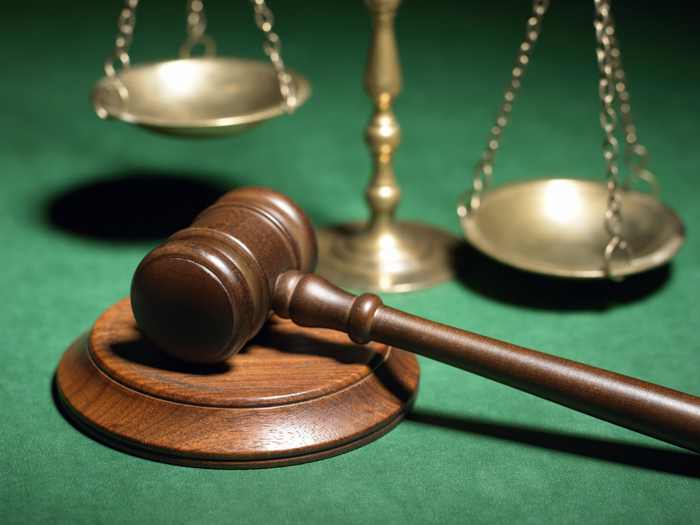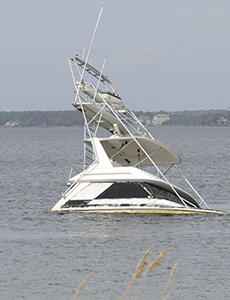The Law
Legal Spotlight

Court Sinks Subrogation
On March 17, 2012, the commander, a vessel owned by Nature’s Way Marine, ran aground in the mouth of a narrow channel of the Mississippi River near Crown Point, La., owned and operated by Crown Point Holdings LLC.
 As it maneuvered to free itself, the movements created “extreme wave wash” that broke the mooring lines of two of Crown Point’s vessels, the Port Gibson and the Buccaneer, grounding them on a mud bank.
As it maneuvered to free itself, the movements created “extreme wave wash” that broke the mooring lines of two of Crown Point’s vessels, the Port Gibson and the Buccaneer, grounding them on a mud bank.
On March 21, the Port Gibson began to take on water and sank, pulling the Buccaneer down with it. After raising the ships, it was discovered Port Gibson’s hull was punctured by a bolt-studded piece of timber.
Osprey Underwriting Agency Ltd., which issued Crown Point marine hull insurance on the Port Gibson and the Buccaneer, paid for salvage and damage expenses and then, as subrogee, it sued Nature’s Way for reimbursement, arguing the Commander’s maneuvers caused the sinking of Crown Point’s vessels.
A district court in Louisiana ruled against Osprey. It said Osprey failed to prove the Commander’s actions caused the sinking, and even if the causation could be determined, Crown Point’s failure to warn anyone of the timber impaled in the hull was a superseding cause of the sinking.
On March 25, the U.S. 5th Circuit Court of Appeals upheld that decision. It concluded that experts from both sides “vehemently” disagreed with how the hull impalement occurred, and that marine law required negligence to be a “substantial factor” in the damage.
Scorecard: Osprey will not be reimbursed for its costs to salvage and repair the vessels.
Takeaway: Under general maritime law, “negligence must be a ‘substantial factor’ in the injury.”
Legal Fees Contested
On Dec. 29, 2011, William R. Kowalski and Hawaii International Seafood filed suit against Anova Food LLC, claiming patent infringement and false advertising. The lawsuit accused Anova of using Kowalski’s “tasteless smoke” process to treat tuna, although Anova advertised the fish were treated by a “clearsmoke” process.
Anova retained Gary Grimmer as local counsel in Hawaii to represent it.
On Oct. 12, 2012, Anova requested a defense from the Hanover Insurance Co. and its subsidiary, Massachusetts Bay Insurance Co. (“Hanover”). Defense was granted under a reservation of rights, and the insurer agreed to pay Grimmer in accordance with its litigation guidelines and fees.
Hanover’s claim that it only agreed to hire Grimmer and not Zobrist conflicted with its payment of some of Zobrist’s legal fees, the court ruled.
Hanover stated it would not pay, however, for any fees paid by Anova prior to the claim being made.
The insurer said it would not apply the exclusion for injuries “arising out of” infringement of intellectual property, but would not indemnify Anova for any punitive damages.
On Dec. 11, 2012, the Zobrist law firm, which had a history with Anova’s intellectual property issues, filed its appearance as counsel of record for Anova, and was subsequently paid $284,624 by Hanover.
A year later, Hanover informed Anova it was transferring defense in the case from Grimmer to two other attorneys. At that time, it said that any continued involvement by Zobrist “will need to be funded directly” by Anova.
On June 19, 2014, Hanover asked for a court determination that it need not defend nor indemnify Anova. The insured filed a counterclaim for breach of contract and bad faith, arguing Hanover owed it a defense, and the unpaid balance to Zobrist of $385,153.
Anova reached a settlement with Kowalski in April 2015.
The U.S. District Court for the District of Hawaii ruled on March 24, 2016 that Hanover did have a duty to defend Anova but did not have to pay for legal services prior to Anova’s request for a defense.
Because factual questions remained about the legal fees paid to Zobrist, the court denied Anova’s motion for summary judgment on its claim that Hanover breached its contract.
Scorecard: Additional court proceedings will determine whether Hanover must pay $385,153 for Zobrist’s legal fees.
Takeaway: Hanover’s claim that it only agreed to hire Grimmer and not Zobrist conflicted with its payment of some of Zobrist’s legal fees, the court ruled.
Request for Defense Denied
In 2009, Larry Naquin was using a land crane owned by Elevating Boats LLC (EBI) to move a “test block” when the welding holding the crane to its base failed.
Naquin jumped from the crane house, breaking both feet and sustaining a lower abdominal hernia. He was never able to return to physical work.
 In May 2012, a federal jury in Louisiana awarded Naquin $2.4 million for physical and emotional pain and lost wages. EBI appealed and the negligence verdict was upheld.
In May 2012, a federal jury in Louisiana awarded Naquin $2.4 million for physical and emotional pain and lost wages. EBI appealed and the negligence verdict was upheld.
Subsequently, EBI sued State National Insurance Co. and London insurers, accusing them of breaching their contracts by denying EBI’s request for defense and indemnification.
On March 22, the U.S. 5th Circuit Court of Appeals agreed with a lower court in dismissing EBI’s lawsuit.
Scorecard: The insurers are not responsible for indemnifying EBI.
Takeaway: EBI’s policy offered indemnity for the company “as owner of the Vessel,” and it was not triggered because the accident occurred on land. &










